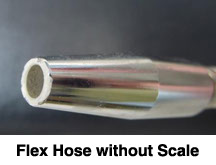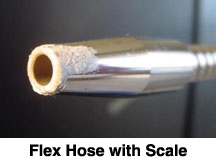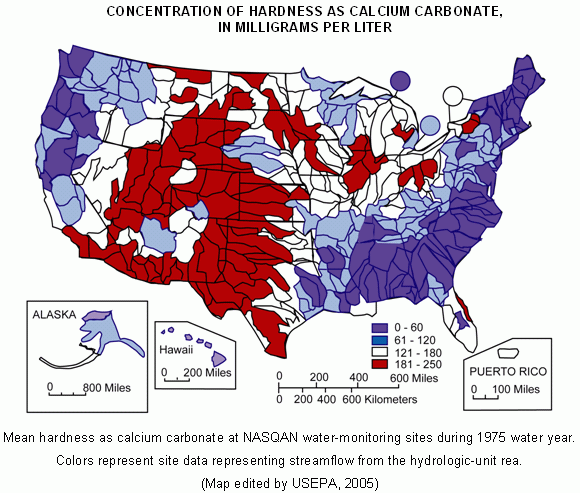Questions? : Call 1800 121 4415 (Monday to Saturday 10AM to 6PM)

Hard Water Treatment Options
How Water Quality Impacts Ionizer Performance
Water quality will play a significant role in how your water ionizer – in fact, any ionizer - performs and its longevity. An ionizer requires mineral content to create those valued alterations in pH, ORP and to also produce molecular hydrogen. Minerals are not only required, but they are also good. Calcium, potassium, and magnesium all naturally occur in water and are called the “essential alkalizing minerals” because they are essential to our health.
The minerals in water are conductive. Conductivity allows for the electrical charge that produces the alterations we are seeking in alkaline, ionized water. Minerals provide a certain “vitality” to water.
Water that lacks mineral content, such as water from reverse osmosis or distillation, has no conductivity and is considered by many to be “dead” or denatured water. It is important to note that all water found in nature has some level of dissolved mineral content, so these types of “pure” waters are literally a man-made phenomenon. Our bodies are designed to drink water with minerals, to use calcium for bones and magnesium for the heart etc. and mankind has been doing so since the dawn of time. It is only in the last few decades, that we have been exposed to pure and mineral free water - often in bottles.
The more mineral content your water has, the more easily your ionizer will alter the water and the better performance it will achieve and conversely. Water with a high level of mineral content is called hard water, while water with a low mineral content is called soft water.
That stated, all AlkaViva water ionizers will produce an ideal range of healthy drinking water, in both hard and soft water areas, unless used in extreme water quality situations. Please contact AlkaViva Technical Support if your water is unusually hard or soft as you will probably need pretreatment (more details below).
Hard Water Explained
What is Hard Water?
If you live in a hard water area, perhaps you have noticed mineral deposits on your dishes and hot water kettle, or rings of insoluble soap scum in your bathtub. These are signs of hard water. Hard water is water that contains high levels of scaling calcium, iron or magnesium mineral ions. These minerals do not pose any health threat, unless in very high amounts, but they can engage in reactions that leave deposits or scale that may damage surfaces or appliances.
Hard water mineral deposits or “scaling”, is the precipitation of minerals which form limescale. Scale can clog pipes and can decrease the life of virtually all appliances in the home, especially those that use hot water. Scale can do the same thing to your water ionizer, decreasing water flow, performance and longevity.
Signs of Hard Water


* Difficult to form lather with soap
* White mineral deposits on your glassware
* Soap scum in your bath tub
* White mineral deposits on your shower head
* White mineral deposits in your teapot, iron, or other electrical appliance that uses water
Hard and Soft Water Areas in the USA

According to the United States Geological Survey, 85% of US homes have some level of hardness in the water. In most areas, the level of hardness is acceptable for ionizers. However, be aware that there are isolated pockets in Arizona, Southern California, Texas, Utah, New Mexico, the Midwest and in well water sources all over the US, that have extremely hard water, which can cause ionizer malfunction and/or long term scale damage.
The softest water occurs in parts of New England, South Atlantic-Gulf, Pacific Northwest and Hawaii. It is important to note that these are generalities; you can find well water sources in soft water areas that have very hard water and conversely, you can find soft water in hard water areas.
NOTE: The above map is only to be used as an approximation and used to gain a general understanding of the water quality with respect to hardness of a given geographic area. The measurements in any area can be higher or lower, especially if you are on well water. If in doubt about the hardness of your water please contact AlkaViva Technical Support.
Hardness and Ionizer Performance
A water ionizer requires mineral content to operate because minerals conduct electrical charge that produces the alterations found in ionized water. Water that has little or no minerals has no pathway for the electrolysis or "ionization" to occur. Ionizers are designed to perform optimally within a specific range of mineral content in the source water; too many minerals may damage any ionizer, too few you may experience decreased performance. With the right range of conductive minerals, your ionizer will easily alter the water and produce expected performance measurements in H2, pH and ORP.
Hard Water Treatment Solutions
To protect your investment properly, you must first determine the level of hardness in your water. You can use the Hard Water Test Kit that is supplied with every AlkaViva water ionizer, have your water tested, or get test data from your supplier. The following are AlkaViva’s recommended treatment solutions:
- Hardness below 50 ppm = We recommend UltraWater Filter
- Hardness 51 ppm – 250 ppm = EOS Anti-Scale Inline Filter
- Hardness 251 ppm – 425 ppm = Ultra Spartan Hard Water Filter.
- Hardness 426+ ppm = AlkaViva R/O System w/ Remineralizer or please contact AlkaViva Technical Support for additional information.
Extreme Water Quality Tolerances
AlkaViva does not recommend using a water ionizer without pretreatment of water that has one or more of the following measurements:
- Hardness (or Calcium Carbonate) over 150 ppm (8.5 grains).
- Iron over .3ppm.
- TDS below 40ppm or over 600ppm.
- Calcium above 50ppm.
Note: some reports will show “ppm” some will show “mg/l” – they are the same. Knowingly operating your ionizer above these levels may void your warranty and/or decrease your ionizer’s performance.
In no event shall AlkaViva or its dealers be liable for any direct, indirect, incidental or special consequential damages to property whatsoever, arising from use of its products with improperly treated or untreated hard water.
AlkaViva’s AquaSafe Water Quality Assurance Program
Many ionizer companies will sell you an expensive ionizer and never mention hard water. If you live in an area that has hard water, that is like throwing money down the drain! To properly protect the investment you’ve made in your ionizer, and ensure you get the right pre-treatment at a great price, we are proud to offer our AquaSafe Water Quality Assurance Program.
AquaSafe Water Quality Assurance Program offers you two important water quality “insurance” benefits:
- Hard Water Test Kit. Each AlkaViva water ionizer / H2 Generator includes a highly effective Hard Water Test Kit. The kit includes a simple-to-use hard water test strip which in less than a minute will determine how hard your water is (if at all). The test results fall in ranges of hardness. We include our recommended pre-treatment solution for each range.
- The Most Complete Range Of Hard Water Solutions. The AquaSafe Water Quality Assurance Program allows you to purchase the appropriate pre-treatment solution within 30 days of purchasing your ionizer at a discounted price of up to 30% off retail, depending on the product. Our Technical Support team is available to help you make the right choice.
Other Considerations
Softeners
AlkaViva does not recommend using an ionizer downstream (or after) a sodium or potassium based ion-exchange water softener. If you have a sodium or potassium ion-exchange softener, you will need to do one of the following:
- Bypass the system (if the source water meets the above Water Quality criteria).
- Change the plumbing connectors and install the softener on the hot water only.
- Install a Reverse Osmosis unit and Remineralization Cartridge. The Reverse Osmosis will take out the sodium or potassium while the remineralizing cartridge will add healthy minerals back into the water.
Reverse Osmosis (RO) and Distillers
Ionizers will not work well downstream (or after) a RO or distiller. Many homes with an ion-exchange softening system will have an RO system. These systems remove virtually all the mineral content and leave the water with no conductivity. If you have an RO or distiller, you will need to do one of the following:
- Bypass the system (if the source water meets the below Water Quality Tolerances).
- Install an AlkaViva Remineralization Cartridge after the RO system (an easy solution).
Soft Water Treatment Solution
Soft water is very low in mineral and dissolved solid content which gives water its conductivity. Such water would have a TDS below 40 ppm.
In areas with extremely soft water (or if using a rainwater catchment system), it may not be possible to achieve optimal performance of your AlkaViva system. In this situation, an AlkaViva Remineralization Cartridge is recommended. AlkaViva has incorporated a proprietary blend of 70+ organic and inorganic minerals into its Remineralizing Cartridge.
Well Water
The quality of well water can vary greatly and pose some health risks if not tested and mitigated. Well water needs to be tested before using with a water ionizer. Most wells are perfectly suitable for ionizer operation; you just don't want to be on the wrong side of that equation unwittingly.
The use of well water poses a number of questions when considering the use of an ionizer. In addition to measurements of water quality for ionization performance and longevity, health safety related issues are also important considerations when using well water.
Recommendation: Many states require a well water test report in the closing documents of a home sale. Many local governmental Health Agencies offer free testing of well water. We recommend contacting them first. AlkaViva offers at a discounted price a Professional Water Test done in a certified laboratory. More details here.
Important Notes:
- Please contact AlkaViva if your water falls into any one of the above categories. If your situation requires additional technical assistance, AlkaViva Technical Support will work with you to find a happy solution. If your water is within 10% of two or more of the Extreme Hardness categories, you could possibly experience performance issues with your water ionizer. You may require pretreatment. Please contact Technical Support for guidance.
- If you are uncertain of the water quality in your area, please contact your local water supplier and request the specific Water Quality information above. The appropriate phone number will be on your water bill. If using well water, contact your county or state health department to inquire about water testing services.
